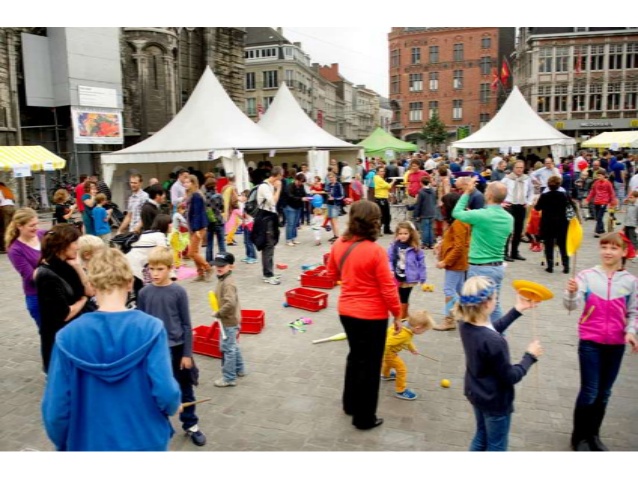To the spirit of the #SharingSpring, The Sharing Cities Network and Center for a New American Dream communities are hosting local ShareFests in cities around the world. Focused on the transformational experience of sharing, these events will be co-created by local sharing organizations and the public. 20 cities have already committed to hosting ShareFests so far. And many more have expressed interest.

You can sign up here to help organize a ShareFest in your city! If you or someone else is already starting to organize one, just let us know on the sign up form. We’ll connect you with other sharing enthusiasts in your city and help promote it.
ShareFests are participatory events designed to connect the local sharing economy that range in size from intimate 20 person events hosted by community organizations like timebanks, to large three day public gatherings with over 3,000 people! A ShareFest can be a powerful way to kickstart the sharing movement in your city, attested by cities across the world that have already organized them including Santa Rosa, California to Paris, Ann Arbor, Michigan, Ghent, Belgium and more.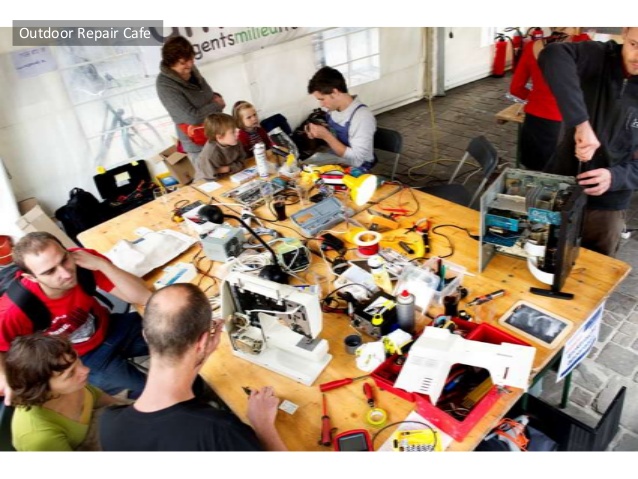
ShareFest Ghent repair cafe
ShareFests are the perfect opportunity to bring people together who are interested in sharing and excited to create a sharing city together. For newbies, a ShareFest can be a great introduction – it’s one thing to read about the sharing economy, and another to experience how rich life can be living in it first hand. If your city is already on its way to becoming a sharing city, a vibrant ShareFest helps show that everyone involved is part of a bigger movement and aren’t alone their work!
What can a ShareFest include? It’s up to your community to design it with local flavor.
-
Your event can provide open space for visioning, brainstorming, and planning to collaboratively create a city with shared food, housing, work, finance, health, art, transportation, energy and more.
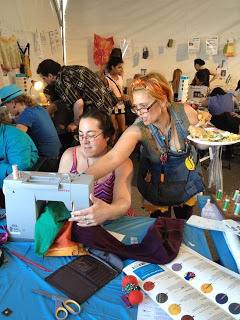
-
It should highlight existing sharing projects, organizations, businesses and government agencies in your community, like the ones mapped during the Sharing Cities Map Jam. Ask local organizations, projects and companies dedicated to resource sharing to table and showcase their work at your event.
-
Ask organizations to host workshops on relevant topics like: creative reuse and repair, how to start a housing/food/worker co-op or a coworking space, resource sharing (tool libraries, seed banks, car sharing, etc.), community currencies, co-operative childcare, urban fruit gleaning, soft skills of sharing and more! Our how to share guides can help.
-
In addition to education, ShareFests usually have an experiential component that engages attendees as participants in its co-creation like: a pop-up repair cafe, bike kitchen, trash to treasure art creation station, swap-o-rama-rama (pictured at right) or ‘really really free market,’ open space for skillshares, gift circle, potluck with recipe exchange, or speed dating to match-make for coops.
-
You can invite the public to participate in a creative “Ignite Sharing” session, vote on the best projects for your community and maybe even give them a jumpstart using the Sunday Soup crowdfunding model.
The sky is the limit! As a ShareFest organizer; you can organize the resources, skills and knowledge in your community, but it’s more fun and a lot less work if you co-create the ShareFest with others. And keep it manageable – integrating just a few of these ideas will make an awesome ShareFest.
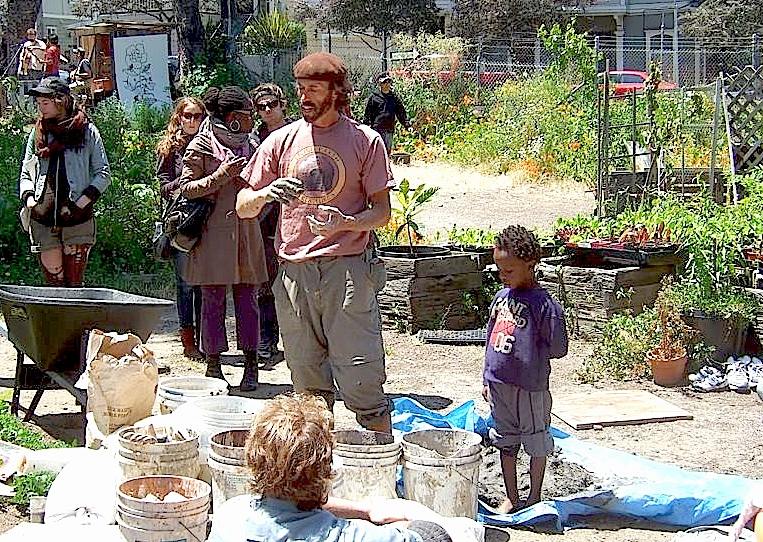
Cob workshop at San Francisco Homestead Skillshare Festival
In the coming weeks, the Center for a New American Dream and Shareable will host a webinar, release an online Toolkit and are teaming up to offer collaborative peer support through the whole process. Please sign up here to co-create a ShareFest in your community!
Here’s some more specific examples of what a ShareFest could look like in your community. We interviewed a handful of ShareFest and Share Fair coordinators to find out how they organized successful events.
 Chicago, IL, Jami Becka and others from with the Chicago Time Exchange have hosted a string of Share Fairs in the last couple of years. These events have ranged in size, are free to the public, and regularly have 100 participants or more. Last year, they had skillshares at the event ranging from their uniquely exciting acroyoga class to fundamentally useful skills like urban farming. They often partner with larger organizations who have access to event venues and extensive mailing lists. They have a core of about five volunteer organizers who typically pair up to coordinate parts of the event that they are excited about. Most of their expenses are covered by donated goods, services, event spaces, and volunteer labor. Their success seems to be directly related to the consistency of events they host and their constant outreach to other organizations for new collaborations.
Chicago, IL, Jami Becka and others from with the Chicago Time Exchange have hosted a string of Share Fairs in the last couple of years. These events have ranged in size, are free to the public, and regularly have 100 participants or more. Last year, they had skillshares at the event ranging from their uniquely exciting acroyoga class to fundamentally useful skills like urban farming. They often partner with larger organizations who have access to event venues and extensive mailing lists. They have a core of about five volunteer organizers who typically pair up to coordinate parts of the event that they are excited about. Most of their expenses are covered by donated goods, services, event spaces, and volunteer labor. Their success seems to be directly related to the consistency of events they host and their constant outreach to other organizations for new collaborations.
 Ann Arbor, MI, Ryan Gourley, founder of A2Share, and a small group of volunteers hosted the first annual Ann Arbor Sharing Summit last Summer. The event brought together representatives from 25 organizations, in addition to fresh faces from the public, at a garden space donated by the University of Michigan. The organizations had tables where the locals could learn how to share more. The event also featured open space breakout groups on: Sharing as a Business, Sharing Food, Sharing the Arts, Sharing Living Spaces, Sharing Skills & Knowledge and more. The gathering was relatively small and intimate, which offered a great opportunity to connect and form new relationships. As a result, there has been increased participation in local sharing projects and use of the Ann Arbor Sharing Economy and Detroit Solidarity Economy Maps (Both can be found at A2Share). Their success has come from unifying local organizations for mutual support and to grow Ann Arbor's sharing economy.
Ann Arbor, MI, Ryan Gourley, founder of A2Share, and a small group of volunteers hosted the first annual Ann Arbor Sharing Summit last Summer. The event brought together representatives from 25 organizations, in addition to fresh faces from the public, at a garden space donated by the University of Michigan. The organizations had tables where the locals could learn how to share more. The event also featured open space breakout groups on: Sharing as a Business, Sharing Food, Sharing the Arts, Sharing Living Spaces, Sharing Skills & Knowledge and more. The gathering was relatively small and intimate, which offered a great opportunity to connect and form new relationships. As a result, there has been increased participation in local sharing projects and use of the Ann Arbor Sharing Economy and Detroit Solidarity Economy Maps (Both can be found at A2Share). Their success has come from unifying local organizations for mutual support and to grow Ann Arbor's sharing economy.
 Ghent, Belgium, Angelo Meuleman, Autopia, and Netwerk Bewust Verbruiken (a network for consumer awareness) hosted the third annual Ghent ShareFest with great success! After initially hosting this event to promote car sharing, it has grown by leaps and bounds in the last three years to include collaborative transportation exhibits, animation for children, creative hair cutters, a "share bar" (buying a drink was not allowed), repair café, book swapping and more. Angelo says it best: “The ShareFest created many opportunities: neighborhoods could inspire each other, people got in contact with many projects and organizations, representatives from the city council got a better understanding of the real potential of the collaborative economy, and the media used this momentum to make in-depth reports.” They were able to attract 3,000 people by hosting their event on “Car Free Sunday” when there was a built in audience of people strolling and biking through the city center. They received a local government grant to cover all of the associated costs of producing an event of this size. Their success seems to come from being in the right place at the right time with enough resources to support their ideas.
Ghent, Belgium, Angelo Meuleman, Autopia, and Netwerk Bewust Verbruiken (a network for consumer awareness) hosted the third annual Ghent ShareFest with great success! After initially hosting this event to promote car sharing, it has grown by leaps and bounds in the last three years to include collaborative transportation exhibits, animation for children, creative hair cutters, a "share bar" (buying a drink was not allowed), repair café, book swapping and more. Angelo says it best: “The ShareFest created many opportunities: neighborhoods could inspire each other, people got in contact with many projects and organizations, representatives from the city council got a better understanding of the real potential of the collaborative economy, and the media used this momentum to make in-depth reports.” They were able to attract 3,000 people by hosting their event on “Car Free Sunday” when there was a built in audience of people strolling and biking through the city center. They received a local government grant to cover all of the associated costs of producing an event of this size. Their success seems to come from being in the right place at the right time with enough resources to support their ideas.
 Paris, France, Francesca Pick, co-chair of OuiShare Fest, has a lot of experience coordinating sharing events in cities all over Europe. A big focus currently is OuiShare Fest, which requires a lot of planning and a large organizing team. The second annual three day conference is expected to attract 1,000 collaborative economy visionaries coming together for keynote speeches, presentations, networking and more. On the final day, portions of the event will be opened up to the general public for an estimated attendance of 3,000! With a core group of three organizers and 14 volunteers, they are still careful not to let the event become unmanageable. They are very resourceful and secure most of the things they need to produce their events for free or through sponsorships from local companies and government. Programming is crowdsourced directly from the sharing community throughout Europe and beyond and embodies the cooperative nature of this movement. Their success comes from a strong grassroots network, years of experience coordinating sharing events and learning from their challenges and triumphs.
Paris, France, Francesca Pick, co-chair of OuiShare Fest, has a lot of experience coordinating sharing events in cities all over Europe. A big focus currently is OuiShare Fest, which requires a lot of planning and a large organizing team. The second annual three day conference is expected to attract 1,000 collaborative economy visionaries coming together for keynote speeches, presentations, networking and more. On the final day, portions of the event will be opened up to the general public for an estimated attendance of 3,000! With a core group of three organizers and 14 volunteers, they are still careful not to let the event become unmanageable. They are very resourceful and secure most of the things they need to produce their events for free or through sponsorships from local companies and government. Programming is crowdsourced directly from the sharing community throughout Europe and beyond and embodies the cooperative nature of this movement. Their success comes from a strong grassroots network, years of experience coordinating sharing events and learning from their challenges and triumphs.
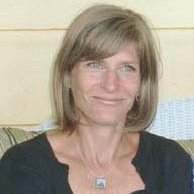 Santa Rosa, CA, Kelley Rajala and organizers of Share Exchange coordinated a large Share Fair and street festival to launch their community sharing initiatives. It was a great success with a diverse turnout of 2,000 people. They closed two downtown city blocks and brought together local businesses, artists, performers and most importantly all of the local sharing projects like: the tool library, timebank, urban garden share and health cooperative. With a wide range of entertainment, workshops and organizations they were able to attract a large, more mainstream crowd who may not have come to a strictly “sharing” based event. Although the event was free to attend, they had a stuff swap area where people were able to walk out with camping gear, kitchenware, clothing and more for a $5 entrance fee with all the proceeds going to cover the costs of the event. Their success came from having a lot of different attractions appealing to different kinds of people, being located at the center of town and creating a family-friendly atmosphere.
Santa Rosa, CA, Kelley Rajala and organizers of Share Exchange coordinated a large Share Fair and street festival to launch their community sharing initiatives. It was a great success with a diverse turnout of 2,000 people. They closed two downtown city blocks and brought together local businesses, artists, performers and most importantly all of the local sharing projects like: the tool library, timebank, urban garden share and health cooperative. With a wide range of entertainment, workshops and organizations they were able to attract a large, more mainstream crowd who may not have come to a strictly “sharing” based event. Although the event was free to attend, they had a stuff swap area where people were able to walk out with camping gear, kitchenware, clothing and more for a $5 entrance fee with all the proceeds going to cover the costs of the event. Their success came from having a lot of different attractions appealing to different kinds of people, being located at the center of town and creating a family-friendly atmosphere.
Learn more about how to organize a ShareFest with our ShareFest Toolkit and sign up for our webinar with New Dream on March 6th at 11am PST. Join cities across the world, sign up here to support a ShareFest or other sharing event in your community this #SharingSpring!
